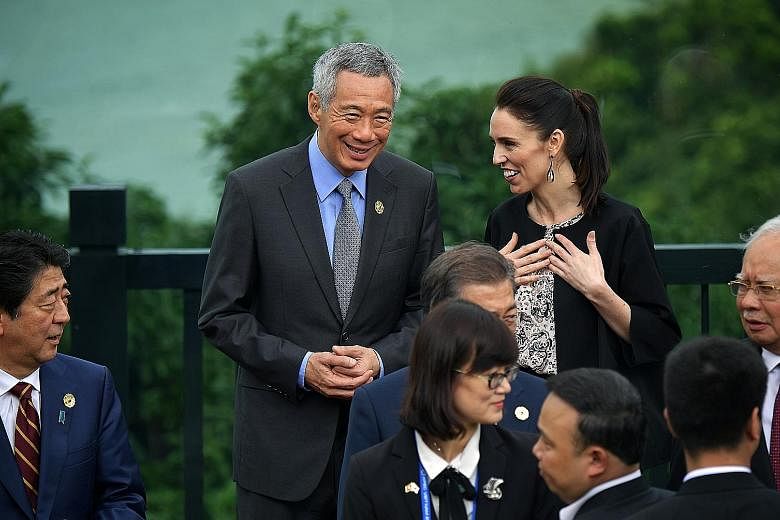The mood towards globalisation is shifting, and there are concerns about whether the current trade system is fair for all to benefit from as they ought to, Prime Minister Lee Hsien Loong said yesterday.
But global trade has allowed many countries to prosper, he told fellow Asia-Pacific Economic Cooperation (Apec) leaders, saying he firmly believes "we should foster more and freer trade to continue to prosper".
He also reiterated Singapore's support for the rules-based multilateral trading system, saying it has brought economies closer together and allowed open dialogue on issues like sustainable development.
At the end of the two-day Apec Summit yesterday, leaders of its 21 economies agreed to ensure a level playing field by pursuing open markets and fighting protectionism, including all unfair trade practices.
A day earlier, leaders of the two largest economies had put forward different visions of trade. United States President Donald Trump said he would pursue fair deals that put America first, while Chinese President Xi Jinping pledged support for multilateral deals and to push for more inclusive globalisation.
Asked for his assessment at an interview with the Singapore media, Mr Lee said all Apec members agree on wanting to promote closer economic integration with mutual benefits, but had different views on how this should be done.
While the US wants to work bilaterally on a reciprocal basis, other members want to keep to a multilateral framework "which in the view of many of us has benefited all our countries, including the US".
But Mr Lee said members understood the political pressures and reasons behind the US administration's stance and still hoped to work together with the US, as well as like-minded countries.
"It does not mean there is a consensus. It does not mean there is no conflict in perspectives, or no tension. There is, but we hope we will be able to work through them and maintain the cooperation that has delivered peace, stability and prosperity to many countries for a very long time," he said.
In an earlier speech to Apec leaders, Mr Lee said being plugged in to the wider global market brings economies of scale, and no single country can be self-sufficient in today's world. Even then, there is still some way to go towards the ideal of fully open trade in the region.
Citing the World Trade Organisation (WTO), which Mr Trump had criticised a day earlier for turning a blind eye to unfair trade practices, Mr Lee said it was an important forum for improving the global framework for trade.
But it takes time for all 164 WTO members to reach a deal, "so we have to explore less comprehensive but more timely measures", he said.
He called for support for the Regional Comprehensive Economic Partnership that Asean's 10 members are negotiating with six others, including China, Japan and India. At the same time, the remaining members of the Trans-Pacific Partnership deal were also pushing ahead to bring the pact into force.
Mr Lee also said developments such as China's Belt and Road Initiative, which includes many economies across Asia and Europe, will also promote greater connectivity, infrastructure investment and economic integration.
Apec, too, is a measure for promoting trade, he said, noting that the grouping had come a long way from its early days as an informal gathering of 12 economies in 1989 formed to liberalise trade across the region.
Tariffs in Apec today are a third of what they were then, and Apec economies represent 60 per cent of global gross domestic product and half of global trade. He also commended Vietnam, this year's Apec chair, for kick-starting a process to review goals set in Bogor, Indonesia, in 1994, for free and open trade and investment across the region by 2020. "As we approach 2020 for the Bogor goals, it is timely to reflect on the aspirations of Apec for the longer term," he said.

